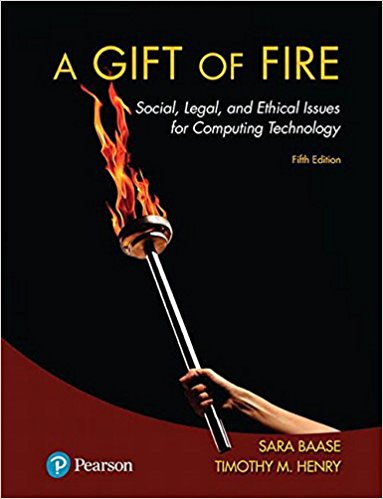
Course Number:
CSE/ISE 312
Title:
"Legal, Social, and Ethical Issues in Information Systems"
Credits: 3
Current Catalog Description:
This course deals with the impact of computers on us as individuals and on our society. Rapid changes in computing technology and in our use of that technology have changed the way we work, play, and interact with other people. These changes have created a flood of new social and legal issues that demand critical examination.
Prerequisite:
U3 or U4 standing, one D.E.C. E or SNW course
Course goals:
• An understanding of how computing and information systems give rise to social issues and ethical dilemmas
• An ability to discuss the benefits offered by computing technology in many different areas and the risks and problems associated with these technologies
• An understanding of some social, legal, philosophical, political, constitutional, and economical issues related to computers and the historical background of these issues
•
To recognize the need for continuing professional development.
Recommended Text:

"A Gift of Fire: Social, Legal, and Ethical Issues for Computing Technology" 5th ed.
by Sara Baase
Pearson
ISBN: 0134615271
Major Topics Covered in Course:
• Privacy
• Freedom of speech
• Intellectual property
• Crime
• Impact on work environment
• Evaluating and controlling technology
• Errors, failures, and risk
• Professional ethics and responsibilities
Course Webpage:
https://www3.cs.stonybrook.edu/~tony/itethics/312info.html
Course email:
itethics@cs.stonybrook.edu
Americans with Disabilities Act: If you have a physical, psychological, medical or learning disability that may impact your course work, please contact Disability Support Services, ECC (Educational Communications Center) Building, Room 128, (631) 632-6748. They will determine with you what accommodations, if any, are necessary and appropriate. All information and documentation is confidential.
Academic Integrity: Each student must pursue his or her academic goals honestly and be personally accountable for all submitted work. Representing another person's work as your own is always wrong. Faculty are required to report any suspected instances of academic dishonesty to the Academic Judiciary. Faculty in the Health Sciences Center (School of Health Technology & Management, Nursing, Social Welfare, Dental Medicine) and School of Medicine are required to follow their school-specific procedures. For more comprehensive information on academic integrity, including categories of academic dishonesty, please refer to the academic judiciary website at http://www.stonybrook.edu/uaa/academicjudiciary/
Critical Incident Management: Stony Brook University expects students to respect the rights, privileges, and property of other people. Faculty are required to report to the Office of Judicial Affairs any disruptive behavior that interrupts their ability to teach, compromises the safety of the learning environment, or inhibits students' ability to learn. Faculty in the HSC Schools and the School of Medicine are required to follow their school-specific procedures.
Minimal Student Responsibilities: http://sb.cc.stonybrook.edu/bulletin/current/policiesandregulations/policies_expectations/min_instructional_student_resp.php
Course Coordinator:
Rob Kelly
robkelly@cs.stonybrook.edu
Course Instructor:
Tony Scarlatos
anthony.scarlatos@stonybrook.edu